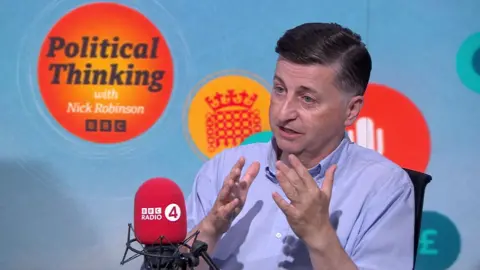The sentiment toward spending on international aid has shifted considerably, as indicated by the recent statements made by Trade Minister Douglas Alexander. Appearing on BBC Radio 4’s “Political Thinking with Nick Robinson,” Alexander asserted that the public no longer supports expenditures in this sector. His comments arise amid discussions on the implications of recent government decisions on aid spending and the broader context of public opinion regarding humanitarian assistance.
Alexander, who served as the Secretary of State for International Development under former Prime Minister Gordon Brown, elaborated that even if financial resources were abundant, the case for international aid would still need to be articulated effectively. Earlier this year, Prime Minister Sir Keir Starmer made headlines by announcing a reduction in the international aid budget, reallocating those funds to bolster defense spending. This decision has not gone without contention; various charities have vocally criticized the cuts, arguing that they would severely impact vulnerable populations worldwide and ultimately damage the UK’s interests.
In his interview, Alexander expressed his longstanding belief that investing in global aid is both morally necessary and strategically advantageous. However, he openly acknowledged that “we have lost the argument” regarding the importance of such investments, suggesting a fundamental shift in public discourse surrounding international aid. Alexander noted that public consent for aid spending has diminished significantly, resulting not only from fiscal constraints but also from cultural shifts in attitudes towards foreign assistance. He mentioned that now the case for aid must be made anew, an acknowledgment of changing perceptions that must be navigated by political leaders.
The context of this discussion highlights broader trends in several Western nations—such as the United States, France, Germany, and Norway—where there has been a retrogression in the commitment to international development funding. These reflections illustrate a mounting global reluctance toward foreign aid initiatives, which policymakers must address.
Alexander reminisced about the “Make Poverty History” march in Edinburgh 20 years ago, a historic gathering where thousands rallied for global aid and debt cancellation for poorer nations. He recounted the emotions of participating in such a significant event with his family, reflecting on the collective call for action aimed at alleviating poverty on a global scale. His reflective tone served as a reminder of the political will and public enthusiasm that characterized earlier campaigns for international development.
He served as the international development secretary from 2007 to 2010 and was part of a government that committed to increasing the overseas aid budget. That commitment was reached in 2013 during the coalition government of David Cameron, which enshrined the 0.7% target into law in 2015. However, this commitment has faced setbacks, particularly as aid was reduced to 0.5% of national income under Conservative leadership in 2021. The rationale provided for this reduction was to maintain fiscal discipline in light of the Covid pandemic’s economic turmoil.
Starmer’s recent decision to further decrease the aid budget to 0.3% by 2027, to fund increases in defense expenditure, reflects a growing focus on national security in British politics. A YouGov poll indicated a sizeable portion of the public, around 65%, supported this shift; however, figures from the Development Engagement Lab project suggest that overall public sentiment regarding aid remains relatively steady compared to the 2010s.
Romilly Greenhill, the chief executive of Bond, emphasized that the British public recognizes the significance of foreign aid, asserting it is integral to both moral standing and national security. Greenhill urged Alexander, in his capacity as trade secretary, to reclaim the narrative on aid and play a pivotal role in reshaping public perception.
In the context of his broader political career, Alexander returned to Parliament as the MP for Lothian East last July, after losing his previous seat in the 2015 election. His recent work on trade strategy is expected to underscore the UK’s service-oriented economy, prioritizing the removal of trade barriers and enhancing cooperation with the European Union on various economic fronts.
As discussions about aid funding continue to unfold, the challenge for leaders like Alexander will be to reconcile declining public enthusiasm with the rationale for maintaining robust international support mechanisms. His forthcoming trade strategy may represent a key opportunity in this respect. Ultimately, addressing the complexities of aid spending and its public perception will be crucial for forging a future where both domestic priorities and global responsibilities can align.



